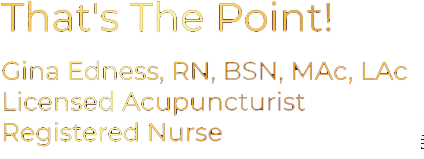Some common questions about acupuncture are answered below. Call us if you have other questions or if you are interested in improving your life through acupuncture treatment.
- Peace.
It does not mean to be in a place where there is no noise, trouble, or hard work.
It means to be in the midst of things and still be calm in your heart.
-
 That’s The Point! Acupuncture410-979-1498
That’s The Point! Acupuncture410-979-1498 -
 12165 Clarksville Pike
12165 Clarksville Pike
Suite 308
Clarksville, MD 21029 - Testimonials
When western medicine couldn’t help me, I turned to eastern medicine. I found Gina because she was in walking distance to my work, and immediately felt comfortable with her because she was a Hopkins nurse for many years before. She fit me into her schedule and now I’m a regular 5 months later. A.G. Baltimore, MD
As a healthcare professional myself I feel that I am a fairly good judge of practitioner abilities. I look for the very best standard of care, physical and emotional improvements, and a personal connection.
I consider myself very fortunate that I found Gina. She is an awesome diagnostician and knows just where to place the needles to get the appropriate response. She is also very intuitive. My experience with acupuncture in the past has been varied. I have been a patient... Read more »” I was probably one of the most skeptical patients a practitioner could have. And now after several years of seeing Gina Edness on a regular basis, I am a true believer in the power of acupuncture. It still seems like a miracle to me, but it’s real and it works! The added bonus above and beyond feeling better physically is that after a visit with Gina I am a happy girl – she is a delightful person who simply
... Read more »“My doctor, from personal and patient experience, recommended and prescribed acupuncture to me almost three years ago to help manage an acute back injury and chronic back and hip pain. After a short search I was fortunate enough to find Gina who, right from the beginning, worked closely and unwaveringly with me on not only my physical symptoms and health, but mental and spiritual health as well. With Gina’s sincere kindness, warmth, and compassion, and through her commitment to healing
... Read more »“There are many Chinese Medicine practitioners of acupuncture, however, Gina is by far the best I have ever encountered. Her warmth, empathy and professionalism have helped me through a number of health issues. She has always been there for me giving 100%.”
D.N. Pikesville, MD
-
Latest Articles:
- • The Best Ways to Protect Your Skin from the Sun This Summer •
- • Savoring Summer with Recipes Using the Best Summer Ingredients •
- • Top 5 Best Staycation Ideas for Summer •

